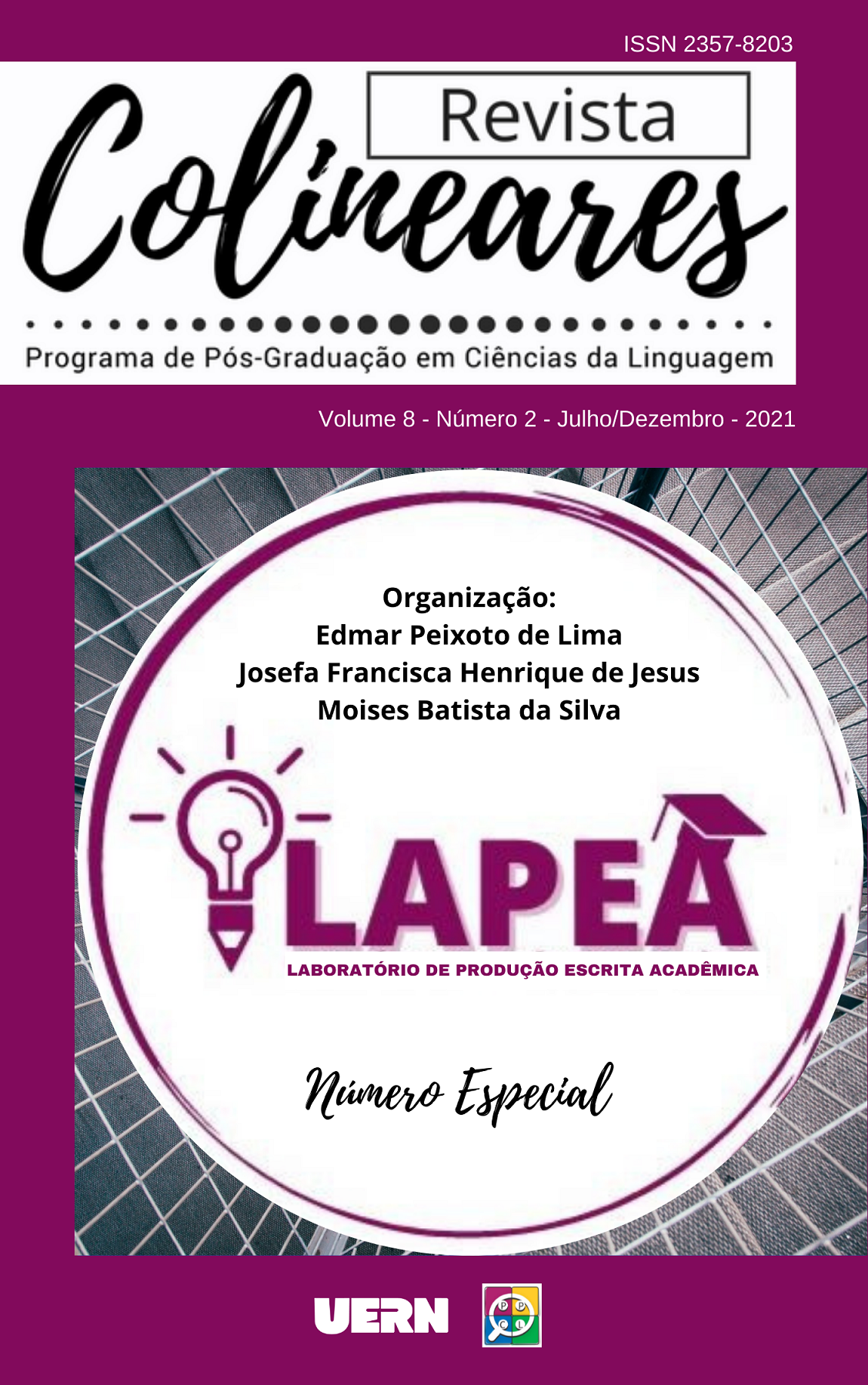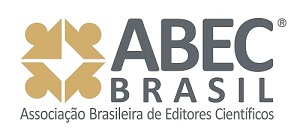READING, WRITING AND LINGUISTIC ANALYSIS: AN ANTI-RACIST INTERPRETATIVE APPROACH
Keywords:
Reading, Writing, Linguistic analysis, Critical literacy, Anti-racismAbstract
Teaching of Portuguese language requires studies with language, in view of the daily practice of interaction. In that case, linguistic analysis is an important knowledge, which must be carried out with reading and writing practices. Through linguistic studies, several theories have been developed in order to possibility theorical assumptions that consider linguistic practice linked to the social context. Literacies and Multiliteracies are example of advanced approaches in these studies, considering the multiplicity of genres and social contexts, which require these skills (reading, writing and linguistics) as in the case of the virtual environment After these reflections, it is important to highlight the approach to teaching from a perspective of the Theory of Empowerment, based on the proposals of Paulo Freire (Pedagogy of the Oppressed and Theory of Awareness). It was amplified from the debates introduced by Black Feminism and the intersectionality concept, a term coined by Kiberlé Crenshaw. The author explains that "there is an invisibility that is a consequence of the articulation of subordinated groups within the social pyramid" (CRENSHAW apud BERTH, 2019, p. 60). Because of this, it was intended, in the present study, work with transversal themes, based on experiences in the classroom, permeated with conflicts, often trivialized. In conclusion, four texts from different genres (strip, song, cartoon and photography) corroborate the importance of the triad: reading, writing and linguistic analysis, present in the proposed activities. They are essential approaches to teaching Portuguese and necessary for all subjects.
Downloads
References
BAKHTIN, Mikhail (VOLOCHÍNOV). Marxismo e filosofia da linguagem: problemas fundamentais do método sociológico da linguagem. 14 ed. São Paulo: Editora Hucitec, 2010.
BAKHTIN, Mikhail (VOLOCHÍNOV. Os gêneros do discurso: problemas fundamentais do método sociológico da linguagem. 14 ed. São Paulo: Editora 34, 2016.
BRASIL. Lei nº 10.639, de 09 de janeiro de 2003. Altera a Lei no 9.394, de 20 de dezembro de 1996, que estabelece as diretrizes e bases da educação nacional, para incluir no currículo oficial da Rede de Ensino a obrigatoriedade da temática "História e Cultura Afro-Brasileira", e dá outras providências, [2020]. Disponível em: http://www.planalto.gov.br/ccivil_03/leis/2003/l10.639.htm. Acesso em: 04 jun. 2020.
BRASIL. Lei nº 11.645 de 10 de março de 2008. Altera a Lei no 9.394, de 20 de dezembro de 1996, modificada pela Lei no 10.639, de 9 de janeiro de 2003, que estabelece as diretrizes e bases da educação nacional, para incluir no currículo oficial da rede de ensino a obrigatoriedade da temática "História e Cultura Afro-Brasileira e Indígena, [2020]. Disponível em: http://www.planalto.gov.br/ccivil_03/_ato2007-2010/2008/lei/l11645.htm. Acesso em: 04 jun. 2020.
BERTH, Joice. Empoderamento. Feminismos Plurais. São Paulo: Sueli Carneiro, Póle, 2019.
DUARTE, Maria Eugênia. Termos da oração. In: VIEIRA, Silva; BRANDíO, Silvia. Ensino de gramática: descrição e uso. São Paulo: Contexto, 2007. P. 186-204
FREIRE, Paulo. Pedagogia da autonomia: saberes necessários à prática educativa. Rio de Janeiro: Paz e Terra. Coleção leitura, 23ª ed., 2002.
FREIRE, Paulo. Pedagogia do oprimido. 17ª ed. Rio de Janeiro: Paz e Terra, 1987.
GOUVÊA, Lúcia Helena Gouvêa; PAULIUKONIS, Aparecida Lino; MONNERAT, Rosane. Texto, contexto e cotexto: processos de apreensão da realidade. In: PAULIUKONIS, Aparecida Lino et al. (Orgs.). Linguística textual e ensino. São Paulo: Contexto, 2017.p. 49-68.
KATO, Mary. No mundo da escrita: uma perspectiva psicolinguística. 7ª ed. Série Fundamentos. ed. Ática, 2000.
KOCH, Ingedore; ELIAS, Vanda Maria. Ler e compreender: os sentidos do texto. São Paulo: Contexto, 2006.
KOCH, Ingedore. O texto e a construção dos sentidos. São Paulo: Contexto, 2002.
LETRAS. Miss Beleza Universal. Doralyce. Disponível em: https://www.letras.mus.br/doralyce/miss-beleza-universal/. Acesso em: 03 jun. 2020.
LORDE, Audre. Irmã outsider: ensaios e conferências. Belo Horizonte: Autêntica Editora, 2019.
LUFT, Celso Pedro. Moderna gramática brasileira. 4ª ed. Porto Alegre: Editora Globo, 1981.
MARCUSCHI, Luiz Antônio. Da fala para a escrita: atividades de retextualização. 2ª ed. São Paulo: ed. Cortez, 2010.
MARCUSCHI, Luiz Antônio. Produção textual, análise de gêneros e compreensão. São Paulo: Parábola, 2008.
O Globo, 25 de agosto de 2021, ano LXXXVIII, Nº 28873.
PERINI, Mário. A língua do Brasil amanhã e outros mistérios. São Paulo: Parábola Editorial. 2004.
PIETROFORTE, Vicente. A língua como objeto da linguística. In: Fiorin, José. (org.) Introdução à linguística. 6ª ed. São Paulo: Contexto, 2015.
REVISTA TRIP. O pai do menino de cabelo azul. Disponível em: https://revistatrip.uol.com.br/trip/o-pai-do-armandinho-o-menino-de-cabelo-azul-que-reflete-sobre-arte-a-politica-e-direitos-humanos. Acesso em: 07 ago. 2019.
RIBEIRO, Djamila. Pequeno manual antirracista. São Paulo: Companhia das Letras, 2019.
ROJO, Roxane (org.). Escol@ conectada: os multiletramentos e as TICs. São Paulo: Parábola, 2013.
SAUSSURE, Ferdinand. Curso de linguística geral. São Paulo: ed. Cultrix, 1969.
SCHNEUWLY, Bernard; DOLZ, Joaquim. Gêneros orais e escritos na escola. São Paulo: Mercado das Letras, 2004.
TERRA. George Floyd: o que aconteceu antes da prisão e como foram seus últimos 30 minutos de vida. Disponível em: https://www.terra.com.br/noticias/mundo/george-floyd-o-que-aconteceu-antes-da-prisao-e-como-foram-seus-ultimos-30-minutos-de-vida,28e4d231d03f777ebf627d5fcad8b3627oj7ncay.html. Acesso em: 02 jun. 2020.
Downloads
Published
How to Cite
Issue
Section
License
Copyright (c) 2021 Verônica Palmira Salme Aragão

This work is licensed under a Creative Commons Attribution-NonCommercial-ShareAlike 4.0 International License.






